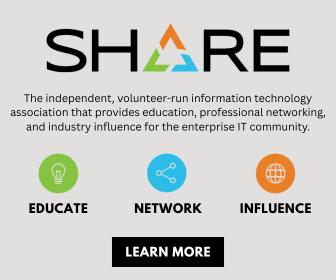PopUp Mainframe and TES Enterprise Solutions Announce Partnership
PopUp Mainframe and TES Enterprise Solutions have announced a strategic partnership to help UK enterprises modernize and accelerate mainframe delivery. PopUp Mainframe’s X and Z Editions provide on-demand, fully functional mainframe environments that mirror production systems, eliminating bottlenecks and lowering the cost of change.
Through the agreement, TES will bring its expertise as a platinum IBM Business Partner and provider of the Digital Trust Fabric — a framework for secure, resilient, and scalable enterprise IT. Together, the companies aim to give mainframe customers faster access to development and test capacity, greater flexibility with LinuxONE and IFL/KVM environments, and stronger support for modernization initiatives in the AI era.
BMC AMI Portfolio July 2025 Release
BMC has announced a July 2025 release that significantly enhances its AMI portfolio, further integrating the mainframe with enterprise IT strategies. Key updates include:
- Security Enhancements: The new BMC AMI Enterprise Connector for Okta enables multi-factor authentication (MFA) on the mainframe using the same Okta solution deployed across x86 and cloud environments. In BMC AMI Cloud, password and IBM zMFA token enforcement can now be applied to login and high-risk operations, securing both on-prem and cloud object storage.
- Cloud Data Management: New multi-volume support in Cloud Data Sets (CDS) allows creation of logical datasets up to 255 terabytes by combining multiple cloud objects. This streamlines backup, archive, and recovery processes without added complexity.
- Developer Productivity and DevOps Insights: BMC AMI zAdviser Enterprise now collects Git usage data to enhance DORA metrics and mainframe-specific KPIs, helping teams identify development bottlenecks and improve delivery efficiency.
- AI-Powered Knowledge Support: A new managed beta feature in BMC AMI Assistant enables users to chat with an AI-powered mainframe expert. The assistant provides guidance by referencing internal manuals, documentation, and support tickets, helping bridge the experience gap for newer or cross-platform professionals.
This latest release builds on BMC’s April 2025 release, which expanded Java support across the development lifecycle and introduced GitLab integration for the BMC AMI DevOps for Db2 Universal Connector, building momentum toward deeper mainframe and DevOps alignment.
Source: BMC
Vertali Expands ‘New To Z’ Program
In July 2025, Vertali welcomed four participants to its New To Z program, a five-year initiative that combines structured training with mentoring and practical experience.The NTZ program blends formal training (including Interskill Learning and IBM SkillsBuild), mentoring, and on-the-job experience, with self-driven learning encouraged throughout. The NTZ program blends formal training (including Interskill Learning and IBM SkillsBuild), mentoring, and on-the-job experience, with self-driven learning encouraged throughout.
Source: Vertali
IBM 2025 Cost of a Data Breach Report
In the wake of rapid AI adoption, IBM has released its 2025 Cost of a Data Breach Report, which shows both progress and new challenges in the evolving cybersecurity landscape.
First, the good news. For the first time in five years, the average global cost of a data breach declined, falling to $4.44 million, a 9% drop from 2024’s $4.88 million. This decrease is largely credited to faster breach containment, driven by AI-powered security tools, which helped reduce mean detection and response times to 241 days — the lowest in nine years.
However, the report warns that AI’s speed and accessibility are creating new risks. While organizations rush to deploy AI, cybercriminals are doing the same, and often with fewer constraints. A key concern is the AI oversight gap. Among the 600 organizations studied, 63% reported having no formal AI governance policies, and 97% of those experiencing AI-related breaches lacked proper AI access controls. The financial impact is clear: high levels of shadow AI (the use of unauthorized AI tools) added an average of $670,000 to breach costs.
AI-related breaches also caused broad operational disruption, from interrupted customer service and sales processing to broken supply chains. The report underscores the need for organizations to reassess foundational cybersecurity frameworks as AI workloads increasingly span cloud and on-premise environments.
With 13% of surveyed organizations reporting direct attacks on their AI models, the risk is no longer theoretical. IBM urges security leaders to collaborate with CAIOs and GRC teams, conduct regular audits, and implement stronger AI controls to protect evolving digital infrastructures — especially in high-value, high-uptime environments like the mainframe.
Souce: IBM
New release alert: IBM Ansible Core v1.15.0-beta.1 now available
The latest beta release of IBM Ansible Core, v1.15.0-beta.1, brings a wave of powerful enhancements and critical bug fixes aimed at improving automation capabilities for z/OS environments. This update focuses on expanding module functionality, improving data set handling, and refining encoding and migrated data sets support. Whether you’re managing GDG generations, working with migrated data sets, or fine-tuning encoding workflows, this release offers meaningful improvements to streamline your automation tasks.
Release Highlights:
- This release adds encoding support to zos_archive and zos_unarchive, improved GDG handling in zos_copy, and expanded data set querying in zos_stat. Modules like zos_job_output, zos_job_query, and zos_job_submit now include new fields: cpu_time, origin_node, and execution_node.
- Several bug fixes improve reliability and consistency, including privilege escalation in zos_fetch, accurate return values in zos_lineinfile, and better error handling in zos_data_set and zos_mount. The release is now available on Galaxy and GitHub. We encourage users to explore the new features and share feedback to help shape future improvements.
Souce: IBM
Mainframe Book Club Dives Into Penetration Testing
Don’t miss the latest episode of the Mainframe Book Club, in which host – and Planet Mainframe Infuential Mainframer – Andy McCandless dives deep into mainframe penetration. The episode features a conversation with Kev Milne, who wrote the first ever book on the subject, as well as developing a free Open Source software (called “Gibson”), which will help pen testers hone their mainframe pen testing skills. If you’re a modern mainframer looking to the future, this promises to be an interesting discussion.





0 Comments